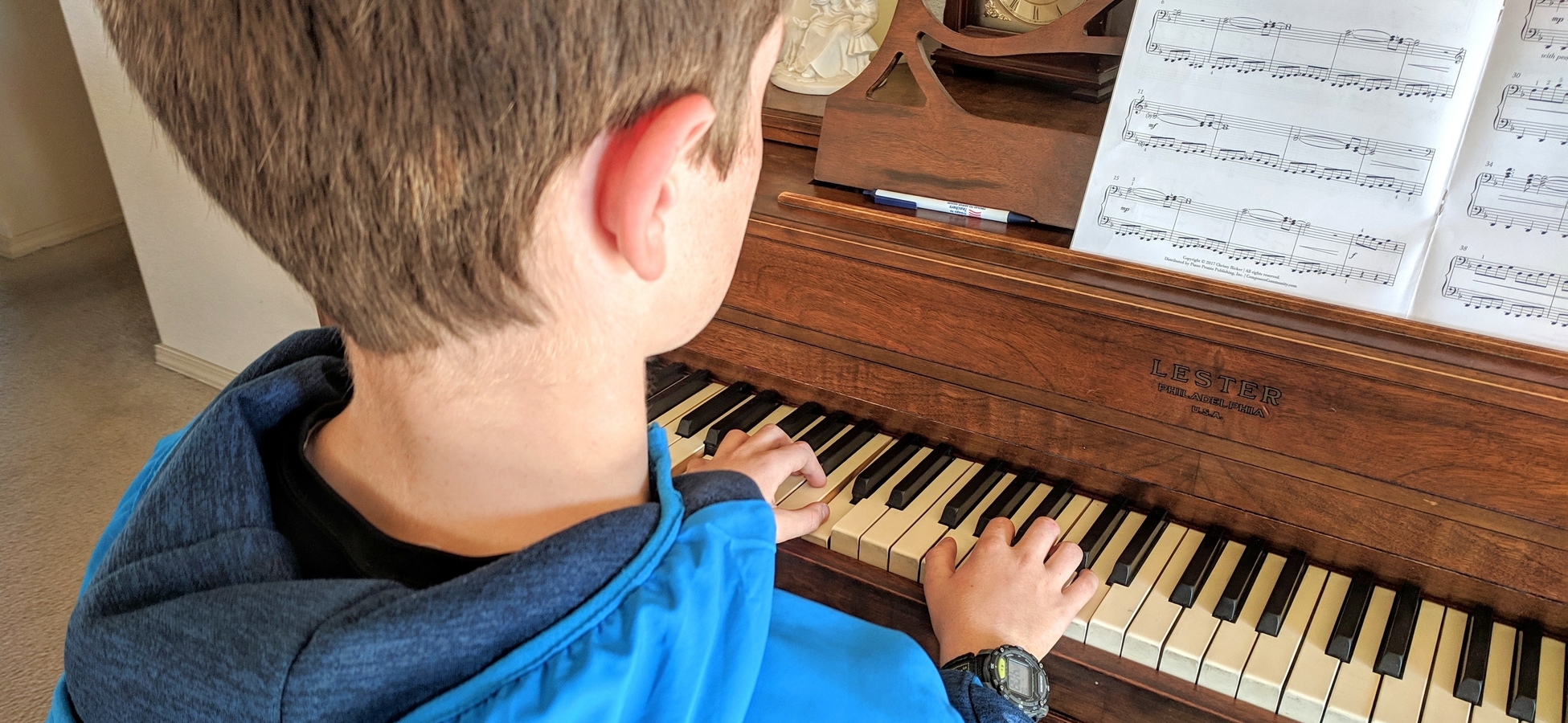Since practice is the key to your child’s success in piano, then you will want to make sure that he/she is practicing as much and as often as they should be!
So how long should a child practice piano each day?
| Daily Piano Practice Time | |
| 3-4 year olds | 5-10 minutes |
| 5-6 year olds | 10-15 minutes |
| 7-8 year olds | 15 minutes |
| 9-10 year olds | 20 minutes |
| 10-12 year olds | 20-25 minutes |
| 13+ years old | 30+ minutes |
Getting in the habit of practicing on a daily basis will ensure your child’s piano future. So how do you make the most of his/her daily piano practice?

Getting the Most out of Practicing
Having your child take piano lessons is one of the best things you can do for him/her. But if you really want to get the most bang for your buck, then you absolutely need to make sure that he/she is practicing the piano on a daily basis.
Almost every day, your child needs to be at the piano, putting in the time and effort. Without practice, your child will not — CANNOT — progress. I can’t tell you how many parents have wasted hundreds, if not thousands, of dollars on piano lessons without seeing a lot of results. The reason? Not practicing!
So you can’t let this huge aspect of piano lessons go unnoticed.
But just sitting at the piano, waiting for the time to pass, will not be that helpful. So it’s your job, as the parent, to help structure the child’s practice habits.
The #1 goal is to make sure that they are practicing. #2 goal should be to make sure that they practice well.
The Ideal Piano Practice for Ages 3-4
When sitting at the piano, make that practice count.
The younger child (usually ages 3-6) will begin a lesson by making sure that they are sitting properly at the piano and have their hands in the proper position.
These habits won’t break once they are older — so make sure they develop now and it will save them a world of hurt later. Literally, it will save them that hurt because improper position can cause back and shoulder pain, not to mention it will limit the ability to perform well in the future.
I would encourage the younger ages of 3-4 to play through their music at least 3 times. Then have them do any exercises, flashcards, or theory assignments that the teacher has assigned. This should usually take the 5-10 minutes on the piano.
If you as the parent can sit down with the child during this time, it will increase the comprehension and retention of the student by a ton! There is a direct correlation between piano advancement and parental involvement. As much as you can be involved at this age, the better.
The Ideal Piano Practice for Ages 5-6
The piano student who is 5-6 years old should also be making sure there is proper position. They will follow a similar routine of playing through their music. At this age, you can begin to increase the repetition a little more. You can begin to have them work through the parts that are a little more difficult, as well.
My goal for a 5-6 year old would be to make sure they are playing things correctly and with fluency. A 5-6 year old will likely begin to have more than one song to work on.
Typically, these songs have words to go with the music. Encourage singing along as they play. It will help them to develop rhythm and will internalize the practice a little more because they are engaging multiple parts of the brain as they sing and play.
Practice should last about 10-15 minutes for this age group.
The Ideal Piano Practice for Ages 7-8
Piano students who are 7-8 years old will begin to have a little more challenging pieces of music. Theory will become more a part of their learning as they are introduced to more music. Their songs will be longer and little more complex.
At this stage, you can help them to work through difficult portions. They will be tempted to run through the songs from beginning to end over and over again. Ideally, you will want them to work the hardest sections first. After they can work through all of the pieces of the song, then fluency can be worked on and they can play through from beginning to end.
Parental involvement is not quite as heavy as the younger ages, but it is still wise to keep on ear out and to listen to make sure they aren’t trying to take “short-cuts”. Those short cuts might include glossing over difficult passages (sometimes not even learning them at all).
These practices typically begin to take about 15 minutes.

The Ideal Piano Practice for Ages 9-12
Piano students ages 9-12 are really starting to get a grip on the piano. Just like with 7-8 year olds, it is important to make sure that they are working strategically with their songs. They need to begin with harder portions first.
Practicing the music should be not only from beginning to end, but they need to start from random places and work through the song randomly. This helps them to truly learn the song.
Memorization can become a larger focus as well. As they learn harder pieces, memorizing them will help them to be able to play away from the music and in other locations — something this age group will particularly enjoy as they show off for their friends.
Practicing for 9-10 year olds typically begins to be about 20 minutes.
The Ideal Piano Practice for Ages 13+
Students who are 13 years or older can begin to really get serious about practicing and spend at least 30 minutes on the piano. If the student is not putting in that amount of time at this stage, then it will really slow their progress.
At least 30 minutes is pretty necessary to get them to learn more and to get them to the next level. Anything less than 30 minutes will just maintain their piano skills,
Yes, it is possible to lose your skills at piano if you don’t practice! Unfortunately, it’s not like riding a bike where you learn once and you are good for life. It needs to be maintained, or it will be forgotten.
Practicing at this stage can become quite enjoyable because the hard-earned skills can pay off and the student can really start to play around and do some things! It is always exciting to get to the next level and this is a great level to be at!
How many days of the week should my child practice?
Since playing the piano is all about training and using the brain, daily practice is ideal. You don’t want to overload the brain though,, so about 5-6 days a week is best for practicing.
I would suggest making it a goal to practice on a daily basis. Then if something happens on a day here and there, it’s totally fine and you can rest assured that you are practicing often enough. Don’t let those days become too often. Average about 5-6 days a week and you should be fine.
You or your child may think that you can skip several days, then practice once or twice for a really long time. This is definitely not the right way to practice piano. A little bit every day will go way farther than practicing a whole bunch for just a day or two.
Practice binging will not give you the best results. Consistency and daily practice are the best. It trains our brain and helps develop those skills. It is similar to working out. If you work out a whole bunch for just a day or two and not again for days on end, it really won’t do you a lot of good.
Keep your practices to 5-6 days a week and you will be happy with the results.
Related Articles:
How Long Do Concert Pianists Practice Every Day?
7 Things You Can Do Today That Will Change Your Piano Practice Forever
31 Real Ways To Get Piano Students to Practice Piano
Tel loves her life as a piano player, a piano teacher, and a mom. Amid piano blogging, piano teaching, and piano playing, she loves a chance to fit in a good exercise class, volunteer at her kids’ school and at her church, and go on long dates with her husband. Full bio at About Tel.



Is it ok to ask my child to practice an hour daily – at least 5 times a week?
She is 8years old by the way.